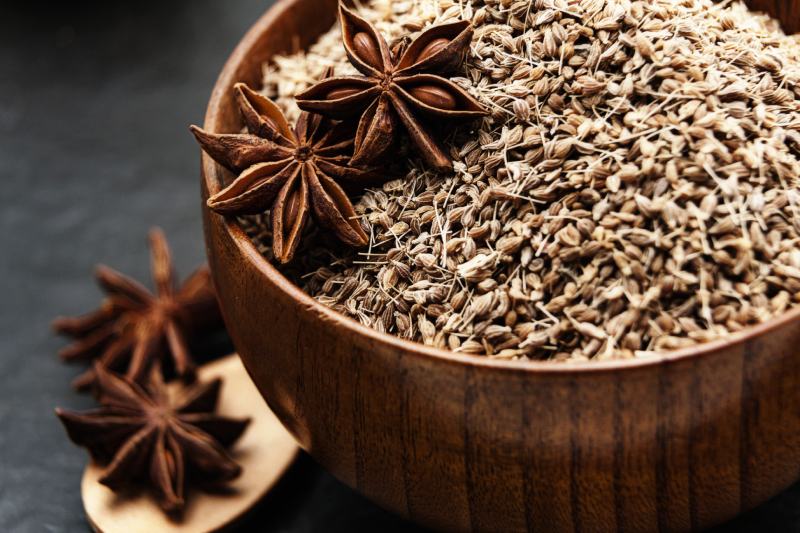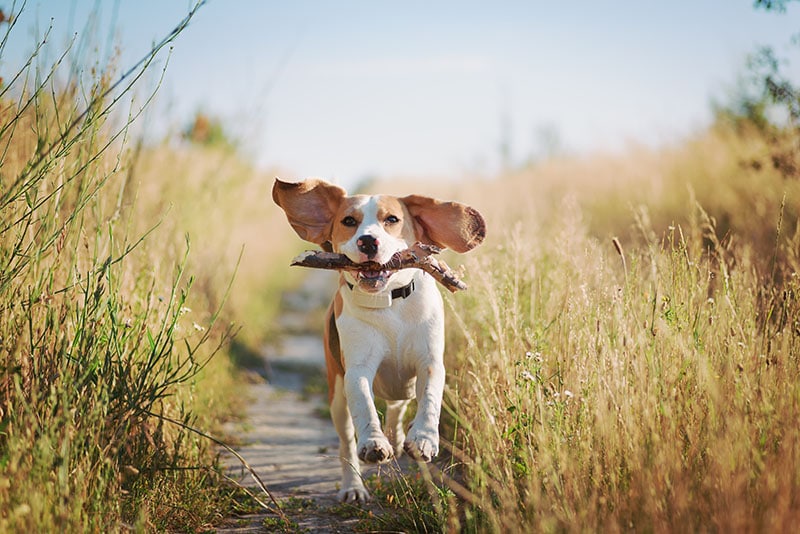Click to Skip Ahead
Dogs can eat anise seed, and the strong-smelling spice is known to be the canine version of catnip. It can be used as a fun, stimulating treat for training or as a natural remedy. Before feeding anise seed to your pup, you need to be aware of some of the risks. We’ll discuss how to serve anise seed safely to your dog, why it should only be an occasional treat, and why dogs react to it.

What Is Anise Seed?
It’s important to note that there is a fruit with a similar name, the star anise from the magnolia family, that has a similar taste and scent. But we are only talking about the spice anise or aniseed (Pimpinella anisum), which is related to fennel, caraway, dill, and cumin and is used in drinks and food. It’s known for its herbal, sweet flavor and fragrance that is similar to licorice.
Anise seed is often ground up or sold as an essential oil. It’s sometimes called “catnip for dogs” because it can cause them to become overly playful and excited. However, it isn’t connected to the catnip plant. Anise seed is used in canine nose work training,1 along with clove and birch. Thanks to their unique scents, trainers can teach dogs to search and follow trails.

Risks From Eating Anise Seed
You should only offer your dog anise seed in moderation; because of its strong aroma, dogs only need a small amount to affect them. Too much can lead to diarrhea and vomiting, so we suggest offering the tiniest amount and monitoring your dog if it is the first time they’ve had any.
We recommend talking to your vet before offering your dog anise seed, especially as too much can be harmful. Not only can it upset your dog’s stomach, but it can also cause nervous system depression; signs of this include a decreased respiration rate, lowered heart rate, and unconsciousness, which can lead to a coma and become fatal.
If you notice any adverse effects to anise seed, stop using it immediately and contact your veterinarian.
PangoVet. It’s an online service where you can <b>talk to a vet online</b> and get the personalized advice you need for your pet — all at an affordable price!
</p>
<div class="su-button-center"><a href=https://www.dogster.com/dog-nutrition/"https://pangovet.com/?utm_source=dogster&utm_medium=article&utm_campaign=dog_eat_drink%22 class="su-button su-button-style-default" style="color:#FFFFFF;background-color:#FF6600;border-color:#cc5200;border-radius:9px;-moz-border-radius:9px;-webkit-border-radius:9px" target="_blank" rel="nofollow"><span style="color:#FFFFFF;padding:0px 24px;font-size:18px;line-height:36px;border-color:#ff944d;border-radius:9px;-moz-border-radius:9px;-webkit-border-radius:9px;text-shadow:none;-moz-text-shadow:none;-webkit-text-shadow:none"> Click to Speak With a Vet</span></a></div></div></div>"}" data-sheets-userformat="{"2":513,"3":{"1":0},"12":0}"> If you need to speak with a vet but can’t get to one, head over to PangoVet. It’s an online service where you can talk to a vet online and get the personalized advice you need for your pet — all at an affordable price!

How Does a Dog React to Anise Seed?
The unique and strong scent of anise seed can be incredibly tempting to a dog, thanks to their fantastic sense of smell. It might make some dogs sleepy and mellow, while other dogs might dislike the strong smell. However, the more common reaction for dogs is to become excited.
After your dog eats anise seed, expect a burst of energy, as it’s anecdotally known to make dogs playful, especially if they’re already energetic. It isn’t something you want them to ingest right before bed because, after consuming anise seed, your dog will be wound up for an hour or two.
Anise seed has also been used as a herbal remedy for dogs and humans to treat digestive issues, skin problems, and pain.

How to Feed Anise Seed to Your Dog
Dogs should only be given anise seed in moderation, but what does that mean? Anise seed can come in different forms, so let’s look at how your dog can enjoy this spice safely.
- Whole or ground: Crushing a few seeds will release more of the aroma, and you can use it in a treat toy or sprinkle a pinch of it on treats or food for a yummy flavor boost.
- Essential oil: You should never put this on your dog’s skin directly or give it to them at full strength since it is very concentrated. Instead, dab it on their collar to introduce the aroma to them.

Final Thoughts
Dogs can eat anise seed, and most will experience an energy boost from ingesting it. However, be aware that they should only enjoy it in moderation, and you only need a small amount to elicit a response. We advise speaking to your veterinarian whenever you’re thinking of adding something new to your dog’s diet. Stop using anise seed immediately and contact your vet if you notice any adverse effects like vomiting or diarrhea.
See also:
Featured Image Credit: Narsil, Shutterstock










